Intro
Discover Escitalopram 5mg tablet uses, a selective serotonin reuptake inhibitor (SSRI) for anxiety and depression treatment, offering mental health benefits and mood stabilization.
Escitalopram, a medication known for its efficacy in treating various mental health conditions, has been widely prescribed by healthcare professionals. The 5mg tablet is a common dosage form of this medication, and its uses are multifaceted. To understand the significance of escitalopram 5mg tablets, it's essential to delve into the world of mental health treatments and the role this medication plays.
Mental health conditions such as depression and anxiety disorders are prevalent worldwide, affecting millions of people. These conditions can significantly impact an individual's quality of life, making everyday tasks challenging and affecting relationships. The need for effective treatments is paramount, and escitalopram has emerged as a valuable option. By understanding how escitalopram works and its benefits, individuals can make informed decisions about their mental health treatment.
The importance of addressing mental health issues cannot be overstated. Untreated conditions can lead to severe consequences, including decreased productivity, strained relationships, and even suicidal thoughts. Escitalopram 5mg tablets offer a glimmer of hope for those struggling with these conditions. By exploring the uses, benefits, and potential side effects of this medication, individuals can better navigate their treatment options.
Introduction to Escitalopram
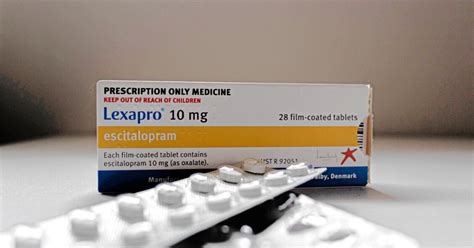
How Escitalopram Works
The mechanism of action of escitalopram involves the inhibition of serotonin reuptake, allowing more serotonin to be available for neural transmission. This increase in serotonin levels helps improve mood, reduce anxiety, and enhance overall mental well-being. Escitalopram is known for its high selectivity for the serotonin transporter, which contributes to its efficacy and relatively favorable side effect profile compared to other antidepressants.Uses of Escitalopram 5mg Tablets
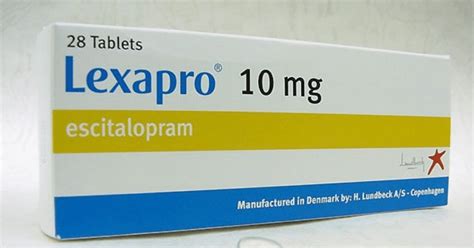
- Major Depressive Disorder (MDD): Escitalopram is effective in treating the symptoms of depression, including persistent sadness, loss of interest in activities, and changes in appetite or sleep.
- Generalized Anxiety Disorder (GAD): It helps reduce excessive worry, fear, and anxiety that are characteristic of GAD, improving the quality of life for individuals with this condition.
- Social Anxiety Disorder: Escitalopram can alleviate symptoms of social anxiety, such as fear of social or performance situations, making it easier for individuals to interact in social settings.
- Panic Disorder: By reducing the frequency and severity of panic attacks, escitalopram improves the management of panic disorder.
- Obsessive-Compulsive Disorder (OCD): Although not the first line of treatment, escitalopram can be used to treat OCD, helping reduce obsessive thoughts and compulsive behaviors.
Benefits of Escitalopram
The benefits of escitalopram 5mg tablets are numerous, making them a preferred choice for many healthcare providers and patients. Some of the key benefits include: - **Efficacy:** Escitalopram has been shown to be effective in treating various mental health conditions, with a significant improvement in symptoms. - **Tolerability:** Compared to other antidepressants, escitalopram is generally well-tolerated, with a lower risk of certain side effects. - **Selective Action:** Its high selectivity for the serotonin transporter reduces the risk of interactions with other neurotransmitters, potentially leading to fewer side effects. - **Dosing Convenience:** The 5mg tablet is easy to administer, and the dosage can be adjusted as needed, making it a flexible treatment option.Side Effects and Precautions
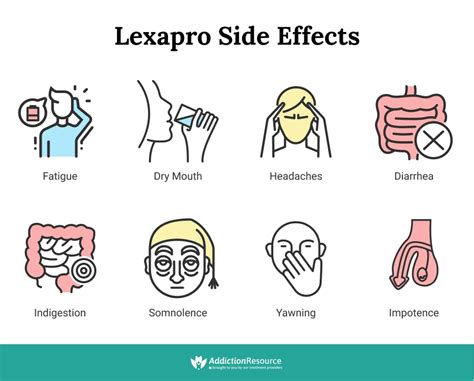
Precautions should be taken when prescribing escitalopram to certain populations, including the elderly, children, and individuals with a history of seizures or bipolar disorder. Interactions with other medications, such as monoamine oxidase inhibitors (MAOIs), should also be considered to avoid adverse reactions.
Interactions and Contraindications
Understanding potential interactions and contraindications is vital for safe treatment with escitalopram. Key points include: - **Medication Interactions:** Escitalopram can interact with various medications, including other antidepressants, antipsychotics, and antiplatelet agents. A thorough review of medications is necessary before starting treatment. - **Pregnancy and Breastfeeding:** The use of escitalopram during pregnancy and breastfeeding should be carefully considered, weighing the benefits against potential risks to the fetus or baby. - **Contraindications:** Escitalopram is contraindicated in patients with a known hypersensitivity to the medication or any of its ingredients.Dosage and Administration
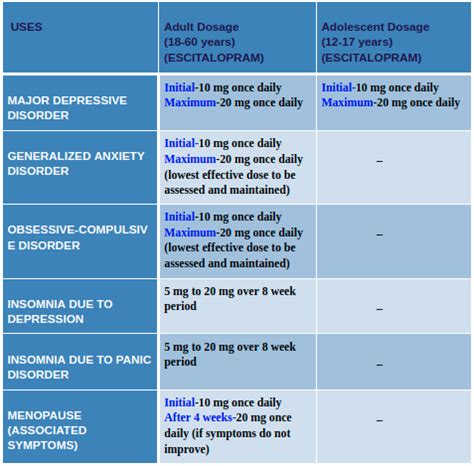
It's essential to follow the prescribed dosage and administration instructions to ensure the efficacy and safety of the treatment. Escitalopram should be taken at the same time each day, with or without food, to maintain consistent drug levels in the body.
Treatment Duration
The duration of treatment with escitalopram varies based on the condition and the patient's response. For depression, treatment typically lasts for at least six months after the symptoms have resolved. For anxiety disorders, the treatment duration can be longer, often continuing for several years to prevent relapse.Conclusion and Future Directions
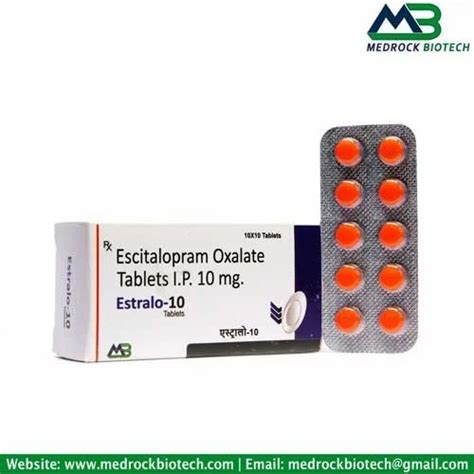
As mental health treatment continues to evolve, the role of escitalopram and other SSRIs will likely remain significant. Ongoing research into the mechanisms of these medications and their applications in different conditions will provide further insights into their benefits and limitations.
Final Thoughts
Mental health is a critical aspect of overall well-being, and seeking treatment is a brave step towards recovery. Escitalopram 5mg tablets offer hope for individuals struggling with depression, anxiety, and other mental health conditions. By understanding the uses, benefits, and potential side effects of this medication, patients can make informed decisions about their treatment and work towards a healthier, happier life.We invite readers to share their thoughts and experiences with escitalopram and mental health treatment in the comments below. Your input can help others navigate their treatment options and foster a supportive community. Additionally, consider sharing this article with anyone who might benefit from the information provided, helping to spread awareness and understanding of mental health conditions and their treatments.
What is escitalopram used for?
+Escitalopram is primarily used for the treatment of major depressive disorder (MDD) and generalized anxiety disorder (GAD). It can also be prescribed for social anxiety disorder, panic disorder, and obsessive-compulsive disorder (OCD).
How does escitalopram work?
+Escitalopram works by increasing the levels of serotonin in the brain, a neurotransmitter that helps maintain mental balance. It does this by inhibiting the reuptake of serotonin, allowing more serotonin to be available for neural transmission.
What are the common side effects of escitalopram?
+Common side effects of escitalopram include nausea, headache, dry mouth, and increased sweating. In rare cases, more severe side effects can occur, such as suicidal thoughts, especially in young adults.
